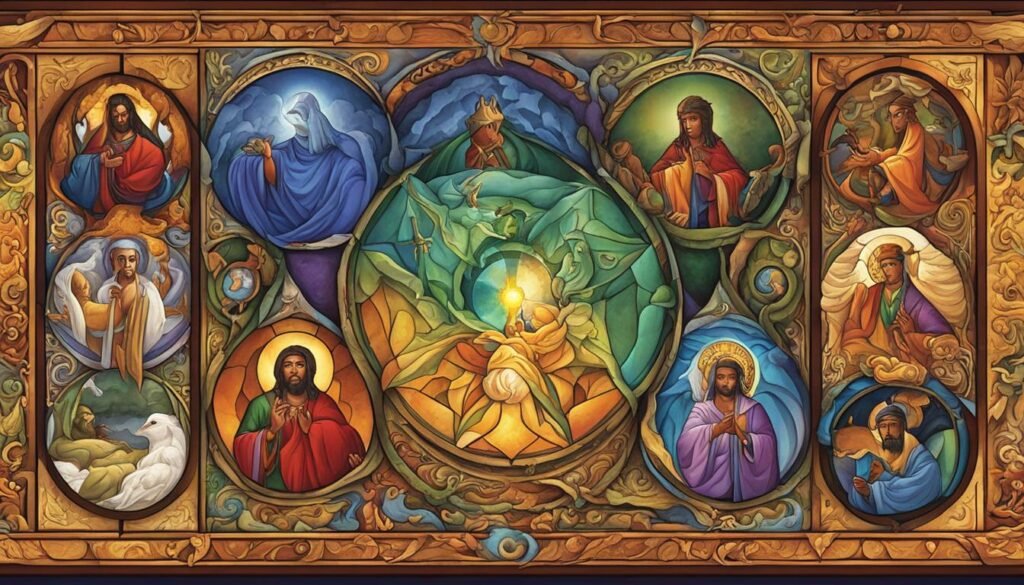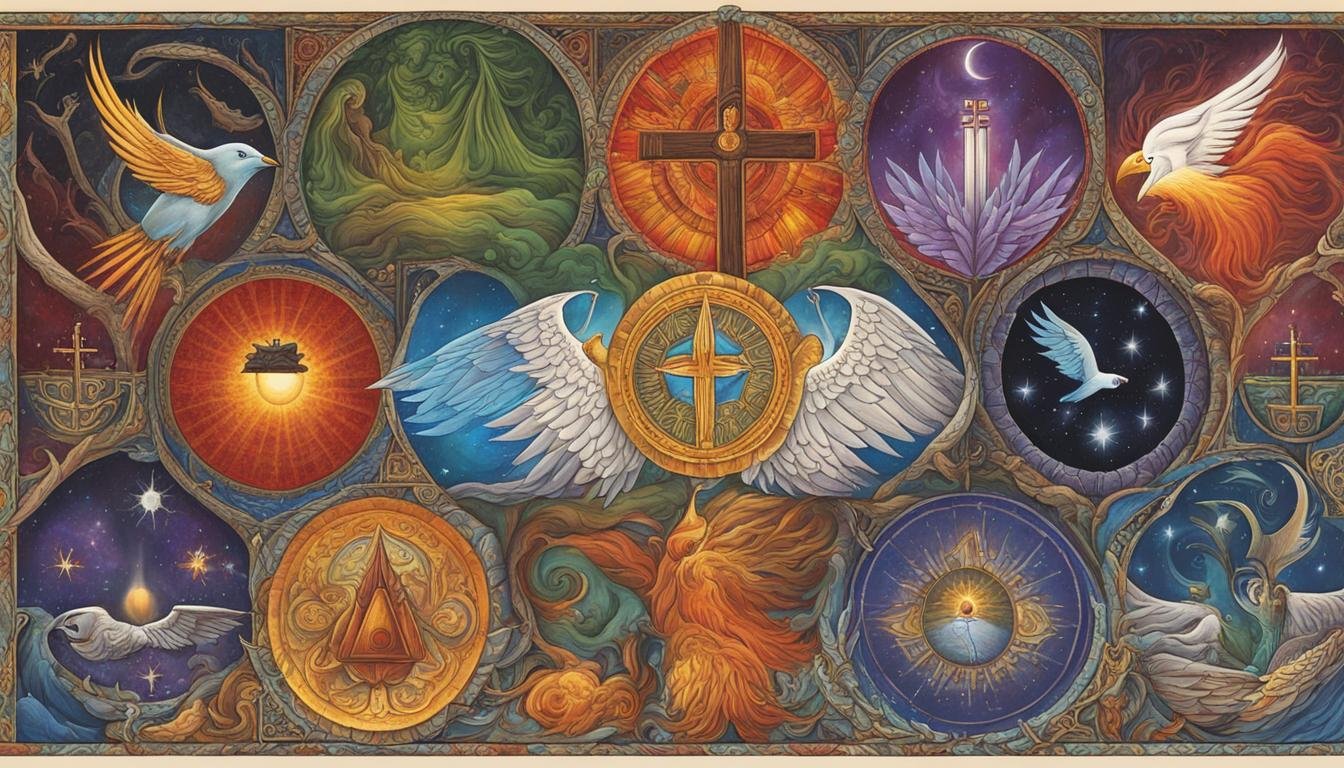The Bible is a rich source of spiritual teachings and references. One intriguing concept mentioned in the scriptures is the presence of spirits. Throughout the Bible, there are various allusions to these spiritual beings, including the notable mention of the “Seven Spirits of God” in the Book of Revelation.
The exact meaning and nature of these spirits have been a subject of interpretation and debate among scholars and theologians. Some believe that the “Seven Spirits of God” represent the sevenfold ministry of the Holy Spirit, as described in the Book of Isaiah. Others perceive them as distinct spiritual beings or symbolic of perfection.
As we delve deeper into the biblical references to spirits, we will explore different interpretations and shed light on their identity and symbolism. Understanding these spiritual entities can provide valuable insights into the divine workings and the role they play in the scriptures.
Key Takeaways:
- The Bible mentions the “Seven Spirits of God” in the Book of Revelation.
- Interpretations of the seven spirits include the sevenfold ministry of the Holy Spirit and symbolic representations of perfection.
- The exact identity of the seven spirits is not explicitly stated in the Bible.
- The number seven signifies completion and perfection in biblical symbolism.
- Exploring the concept of spirits in the Bible offers a deeper understanding of spirituality and divine workings.
Interpretations of the Seven Spirits of God
One interpretation of the “Seven Spirits” is that they represent the sevenfold ministry of the Spirit as described in Isaiah 11:2–3. This includes the Spirit of the Lord, wisdom, understanding, counsel, might, knowledge, and fear of the Lord. These attributes reflect the multifaceted nature of the Holy Spirit’s work in the world. The Spirit of the Lord encompasses the overall presence and power of God, while wisdom, understanding, and counsel highlight the Spirit’s role in guiding and enlightening believers. Might represents the Spirit’s strength and empowerment, while knowledge encompasses the Spirit’s wisdom and insight. The fear of the Lord acknowledges the reverent awe and respect believers should have towards God.
Another view is that the seven graces listed in Romans 12:6–8 reflect the seven spirits of God. These graces include insight, helpfulness, instruction, encouragement, generosity, guidance, and compassion. Just as the Holy Spirit manifests these qualities in believers, the seven spirits can be seen as expressions of these graces in their fullness. Each grace represents a unique aspect of the Spirit’s character and ministry, working together for the edification and unity of the body of Christ.
“The seven spirits of God can also be interpreted as a special entourage charged with specific duties by Jesus. While the Bible does not provide exhaustive details, some have suggested that these spirits function as messengers or agents of God’s will, sent out into all the earth to accomplish His purposes. This view emphasizes the authority and obedience of the seven spirits, acting in accordance with the divine plan.”
Alternative View
As with any symbolic imagery in the Bible, there are alternative views regarding the interpretation of the seven spirits of God. Some see the “seven spirits” as symbolic of perfection. In the Hebrew culture, the number seven often signifies completeness and wholeness. Therefore, the seven spirits of God could be seen as representing the perfect and complete work of the Holy Spirit. This interpretation highlights the comprehensive nature of the Spirit’s ministry, leaving no aspect untouched or unworkable.
While different interpretations exist, the overarching theme remains the same – the seven spirits of God represent the manifold work of the Holy Spirit in the world. Whether understood as the sevenfold ministry of the Spirit, the manifestation of graces, or symbolizing perfection, these interpretations help us grasp the richness and depth of the Holy Spirit’s ministry.

| Interpretations | Sevenfold Ministry of the Spirit | Alternative View | Symbolic of Perfection |
|---|---|---|---|
| Definition | Represents the sevenfold ministry of the Holy Spirit as described in Isaiah 11:2–3. | Views the seven spirits as a special entourage charged with specific duties by Jesus. | Symbolizes the perfection and completeness of the Holy Spirit’s work. |
| Attributes | Spirit of the Lord, wisdom, understanding, counsel, might, knowledge, fear of the Lord. | Insight, helpfulness, instruction, encouragement, generosity, guidance, compassion. | – |
| Symbolism | Representation of the Holy Spirit’s multifaceted work, guiding and empowering believers. | Emphasizes the authority and obedience of the seven spirits as agents of God’s will. | Highlights the completeness and wholeness of the Spirit’s ministry. |
The Identity and Symbolism of the Seven Spirits
Although the Bible does not explicitly identify the “seven spirits of God,” they can be understood as a reference to the Holy Spirit. In various biblical passages, the Holy Spirit is depicted as having a significant role in God’s divine plan. For instance, the Holy Spirit is described as being before God’s throne, held by Jesus, symbolized as seven lamps of fire, and as the seven eyes of the Lamb.
The symbolism of the number seven is prevalent throughout the Bible, often representing perfection and completion. This symbolism further highlights the fullness of the Holy Spirit’s ministry. In Isaiah 11:2, the Holy Spirit is described in a seven-fold manner, emphasizing the completeness and comprehensiveness of His work. This description includes qualities such as wisdom, understanding, counsel, might, knowledge, fear of the Lord, and the Spirit of the Lord.
By understanding the symbolism and the seven-fold description, we can grasp the depth and significance of the Holy Spirit’s role in the spiritual realm. The identity of the seven spirits ultimately points to the Holy Spirit’s divine attributes and His comprehensive ministry, enabling believers to experience the fullness of God’s presence and guidance.
FAQ
How many times is the term “Seven Spirits of God” mentioned in the Bible?
The term “Seven Spirits of God” is mentioned four times in the Book of Revelation.
What are the different interpretations of the “Seven Spirits of God”?
The term has different interpretations. Some believe it represents the sevenfold ministry of the Holy Spirit as described in Isaiah 11:2–3. Others see it as referring to seven distinct spiritual beings or as symbolic of perfection.
What does the sevenfold ministry of the Spirit refer to?
The sevenfold ministry of the Spirit is described in Isaiah 11:2–3. It includes the Spirit of the Lord, wisdom, understanding, counsel, might, knowledge, and fear of the Lord.
Are there alternative interpretations of the “Seven Spirits of God”?
Yes, some see the seven graces listed in Romans 12:6–8 as reflecting the seven spirits of God. These graces include insight, helpfulness, instruction, encouragement, generosity, guidance, and compassion. Others view them as a special entourage charged with specific duties by Jesus.
What is the identity and symbolism of the Seven Spirits?
While the Bible does not explicitly identify the “seven spirits of God,” some understand it as a reference to the Holy Spirit. The Holy Spirit is depicted as being before God’s throne, held by Jesus, symbolized as seven lamps of fire, and as the seven eyes of the Lamb. The number seven is associated with perfection and completion, indicating the fullness of the Holy Spirit’s ministry. Isaiah 11:2 also provides a seven-fold description of the Holy Spirit, emphasizing the completeness of His work.

I’m Benjamin, a passionate spiritual seeker and creator of Verses and Prayers. Alongside my girlfriend Emma and our pet lizard Mulle, I cherish family life, enjoy exploring new places, and am deeply involved in my church community. My love for reading and singing biblical verses inspires every aspect of my journey.

